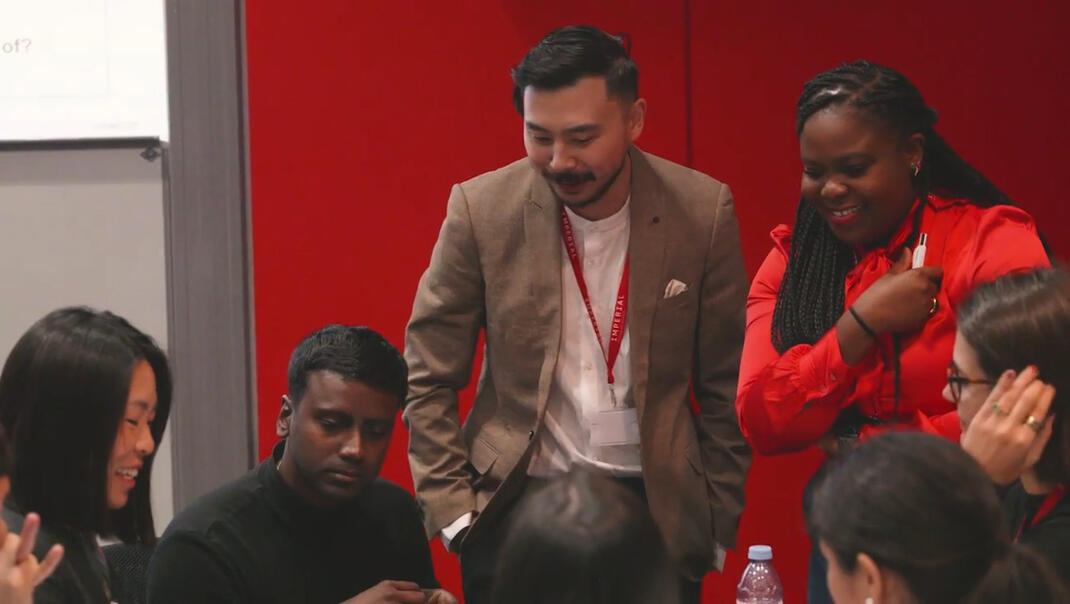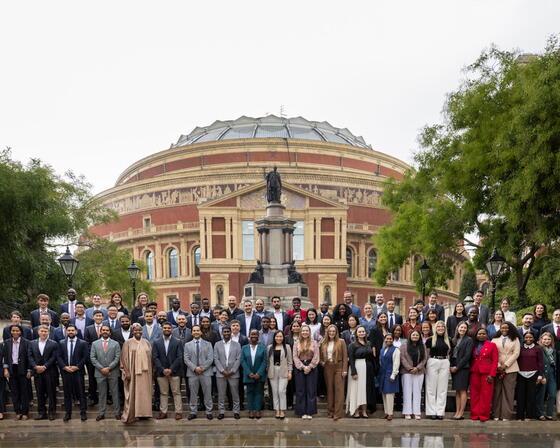
Global Online MBA
21, 24 or 32 months
£57,000
Online
21, 24 or 32 months
£57,000
Online
Study your Global Online MBA at a world-leading university
Developing innovative thought-leaders with a global mindset
As the world becomes increasingly interconnected, it is crucial for business leaders to develop a global mindset. This allows them to effectively communicate with people from all over the world.
Our part-time Global Online MBA is delivered via Canvas, our online learning environment. It offers a rich and diverse learning experience for high levels of personal and professional growth. In this multicultural setting, you will be exposed to a wealth of knowledge, experience and industry insights. This will test your existing perspectives and challenge the status quo.
Our Global Online MBA has two start dates – January and September. You will also have the option to graduate in 21, 24 or 32 months. This allows you to fit the programme around your life and learning pace.
Graduate with a prestigious qualification from a world-renowned Business School. Plus, enjoy the freedom to learn when and where suits you best.

Global Online MBA on-campus experience

A London university with global reach
Graduate with a globally-recognised qualification from a leading London university, studying your MBA from anywhere in the world.

Online learning environment
At Imperial Business School, our online programmes are taught on Canvas. The platform provides convenient access to all programme materials, connects you to your peers and tutors, and gives you the power to track your progress.

A global community
The Global Online MBA attracts a diverse group of individuals from wide-ranging backgrounds, industries, and nationalities. This presents an opportunity to build a truly international network and gain insights into different global business practices

Flexible learning experience
With our Global Online MBA, you have the freedom to choose to complete the programme in 21, 24 or 32 months. This gives you the autonomy to set your own pace and customise your learning journey.
Programme content
Our Global Online MBA offers the choice of two start dates - September and January. Studying via our online learning platform, you will be taught by world-class faculty at the Business School. Their academic excellence and industry knowledge will enrich your MBA experience.
The Global Online MBA covers a broad spectrum of business and management topics, from corporate finance to strategic leadership. Deep-dive into your areas of interest by personalising your learning through concentrations, flexcore and elective modules. Enhance your international impact through the Global Experience Week, and build deeper connections across the MBA community.
All modules have been carefully designed for online study via Canvas and are taught over 10 weeks. This will include recorded and live lectures, reading, assignments, group discussions and activities, case studies, projects and careers support. You can expect to spend around 20-25 hours of study for a typical week which can be demanding when working full-time. However, you will receive ongoing support from our dedicated programme team and your cohort to help you thrive.
View an example Global Online MBA timetable
Programme structure is subject to change and will be confirmed prior to the programme start date.
Online pre-study modules
Before the start of your programme, you will be expected to complete online pre-study modules. These ensure that all students, regardless of undergraduate degree background (or equivalent) are prepared for the programme.
Pre-study modules will be delivered via Canvas our virtual learning environment (VLE). These include primers in key areas including accounting, careers, corporate sustainability, data analysis, finance, maths, plagiarism awareness, and social innovation and ethics.
Please note that some modules are compulsory while others are strongly recommended.
Induction week
The compulsory induction week in London will be the first opportunity to meet your programme team and cohort. Here, you will lay the foundations of your MBA experience. You will have plenty of time to meet and connect with your classmates through various activities and events.
During your five-day induction, you will also attend several lectures, discussions, and exercises introducing you to the programme. Sessions with our Career's team will also be available, helping you plan and develop your career goals.
Watch our video to learn more about induction week on campus.
You will build rapidly on your previous experience while introducing new and challenging disciplines. This will help you acquire the skills to be an effective and inspiring leader in whatever career you choose.
Corporate Finance
Corporate Finance will extend your understanding of company valuation and investment appraisal. It will also introduce the concept of the cost of capital and how it can be calculated. You’ll learn how companies are financed and how to decide between different types of finance.
The module:
- Provides a framework for analysing financial markets and showing how they interact with the key decisions of firms
- Enables you to understand the role of assets, pricing, and the interaction between the economy and financial variables
- Provides information regarding the two key financial instruments (stocks and bonds)
- Introduces the key derivatives markets (futures and options)
- Examines Portfolio Analysis and the risk return trade-off
- Introduces the concepts of risk and return in financial markets and the relevance of diversification
- Explores how return is related to risk through the Capital Asset Pricing Model
Financial and Management Accounting
This module will focus on the use of accounting for financial management and reporting. Learn the techniques of financial and management accounting, examining their relevance to decision-making and management control in organisations.
The module gives you insights into the way that business performance is measured using financial analysis. Plus, learn how strategic business decisions can be structured and analysed using accounting information.
Managerial Economics
The purpose of this module is to:
- Introduce economic concepts encountered in business contexts
- Provide a framework for modelling the interaction between consumers and producers
- Study firms' pricing decisions and the principles of strategic interaction
- Understand how macroeconomic forces affect the economic environment facing firms.
This module covers themes in both macro- and micro-economics. The module starts with microeconomics, building models of supply and demand and how they interact to determine market prices. We will explore situations in which governments typically intervene to change market outcomes, such as with environmental policy. We will study price-setting by firms with market power, and strategic interaction using the approach of game theory.
The module then analyses the macroeconomic backdrop against which businesses and government operate. Learn how the decisions of firms and consumers interact to generate the aggregate outcomes that macroeconomists focus on:
- Total output (GDP)
- Employment
- Inflation
- The balance of payments
The module concludes by discussing the role of monetary policy in steering the economy.
Marketing Management
Among business disciplines, marketing is the primary contact point between a business and its customers. Nearly everybody will, at some point in their career, wear a marketing hat. Understanding marketing will help you, whether you are an accountant, consultant, programmer, banker, or museum curator. It’s crucial to know how to marshal an organisation’s resources to meet customer needs.
This module develops a general management viewpoint in planning and evaluating marketing decisions. You'll learn this from both strategic (e.g. market selection, firm objective, etc.) and tactical (e.g. promotion, pricing, etc.) perspectives. The module will also help you to understand how marketing decisions are affected by organisational and environmental influences.
Organisational Behaviour
What is organisational behaviour? Do organisations really 'behave', so to speak? Or do they sometimes also misbehave? What’s the difference?
Any time you structure/integrate people into a division of labour, predictable behavioural tendencies arise. Some of these tendencies make for effective organisations; others are challenges to overcome. When competition among organisations, changes in environment, and competing demands from multiple stakeholders are added, organisational behaviour arises.
This module covers major factors that shape organisational behaviour and effectiveness. The aim is to develop your ability to address these factors, particularly as leaders. Specifically, we cover material that spans the three major levels at which organisational behaviour is studied:
1. The micro or individual level of analysis
2. The meso or organisational level of analysis
3. Macro levels of analysis such as industries and markets or cultures and nations.
We’ll examine how these activities either come together or not to enable organisational performance and effectiveness.
Strategy
Generally, strategy refers to purposefully allocating resources in a competitive environment, over relatively long periods of time, in the pursuit of specific goals. Strategy is shaped by underlying market conditions and the resources available to management. This includes the firm’s internal structure, systems, and culture. This integration of the external and internal perspectives provides the basic framework for strategic thinking.
The strategy module:
- Gives you a holistic view of the firm
- Helps to develop your ability to think beyond day-to-day business activities
- Challenges you to ask the right questions about a firm’s future
These skills are essential to being an effective general manager.
You will study flexcore modules from the third term of the programme if you choose the fast-track (21 months) option, and from the second year if you choose the standard (24 months) or extended (32 months) options.
Business Analytics
Managers are faced with a wealth of data. This module is about turning that data into actionable insights, leading to well-informed decisions for complex business problems.
Learn how to build a model of the business situation, recognising its essential features and accounting for uncertainty.
These models can be used to:
- Understand what is happening
- Predict what will happen
- Make good management decisions that consider risks arising from management actions
Throughout the module we will use Excel spreadsheets– so that you will build your skills in this area. The applications are multi-disciplinary with links to finance, marketing and operations.
Corporate Innovation
Management of technology and innovation plays an important role in shaping firms’ competitive positions. However, in an increasingly complex global environment, where technological change is endemic and unpredictable, continuously bringing innovations to market successfully is a formidable challenge.
When rapidly changing business and technological environments render their existing competencies less valuable, established firms can struggle to remain creative, flexible, adaptive and resilient. Facing this challenge, organisations are recognising the critical role that an entrepreneurial mindset and innovative thinking play in creating opportunities for growth and renewal.
We focus on the theory and best practices of creating new technologies, products, and businesses. You’ll consider this staying within the boundaries of a large, established corporation. In particular, we will examine:
- Types and sources of innovation
- The diffusion of innovation
- Standards and entry timing
- The management of innovation portfolios and R&D management
- Corporate venturing and open innovation
- Designing innovative organisations
This module will provide students with a rich understanding of the complexities of managing innovation in established companies.
Entrepreneurship
The entrepreneurship module introduces you to the different aspects of entrepreneurial thinking, specifically when it comes to innovative businesses. You will be introduced to:
- The concepts of design thinking, technology and innovation
- Business modelling in nascent markets
- Entrepreneurial finance and leadership
- Legal arrangements such as term sheets and shareholder agreements
Leadership
The leadership module will help you become more aware of your personality traits through:
- Diagnosis (questionnaire assessment exercises)
- Strengths and weaknesses as a leader through insight (introspection and reflection on one’s traits, habits, and behaviours)
- Building on this knowledge to improve your leadership practice (through self-development and how to effectively tackle future challenges)
You will complete four elective modules, unless you take more than the required two flexcore modules. In the latter case, the number of required elective modules reduces accordingly. You will study electives from the third term of the programme if you choose the fast-track (21 months) option, and from the second year if you choose the standard (24 months) or extended (32 months) options.
Please note that students can choose electives across different areas.
Analytics and Operations
The elective modules within Analytics and Operations are:
- Advanced Financial and Sustainability Reporting (On-campus)
- Data Analytics and Visualisation for Business
- Operations
- Operations Management
- Big Data, AI and Machine Learning (On-campus)
Entrepreneurship and Innovation
The elective modules within Entrepreneurship and Innovation are:
- Venture Capital Finance
- AI Ventures (On-campus)
- Design for Business Transformation
- Digital Business Model Design (On-campus)
- Digital Technologies and Digital Transformation (On-campus)
- Entrepreneurial Finance and Venture Capital (On-campus)
- Entrepreneurial Journey
- Leading Social Innovation (On-campus)
- Digital Opportunities: Insights from the Startup Nation (IB Glocal elective)
- The Future of Cities (IB Glocal elective)
- Wicked Problems, Systems Dynamics, and Entrepreneurial Innovation
Finance
The elective modules within Finance are:
- Advanced Corporate Finance
- Asset Management and Alternative Investments (On-campus)
- Finance in Cleantech
- Finance for Net Zero
- Mergers and Acquisitions
- Pricing Strategy
- Private Equity
- Venture Capital Finance
- Asset Management (On-campus)
- The Fintech Revolution: New Markets, Models and Opportunities (On-campus)
- Sustainable Finance and Investments (On-campus)
- Entrepreneurial Finance and Venture Capital (On-campus)
- Blockchain and Applications (On-campus)
Leadership and Organisation
The elective modules within Leadership and Organisation are:
- Decision Making for Leaders
- Family Business (On-campus)
- Leading and Executing Strategic Change (On-campus)
- Leading Social Innovation (On-campus)
- Managing Negotiations
- Strategy and Leadership in a Digital World (On-campus)
- The Future of Cities (IB Glocal elective)
Marketing
The elective modules within Marketing are:
- Applied Strategic Marketing
- Brand Management
- Digital Marketing
- Marketing Analytics
- Market Research
- Pricing Strategy
- The Psychology of Sales: Mastering the Mindset to Drive Results
Strategy
The elective modules within Strategy are:
- Advanced Strategy in a Stakeholder Economy
- Business Problem Solving
- Design for Strategic Transformation
- Digital Business
- Breakout Strategy (On-campus)
- Energy Business (On-campus)
- Global Strategy (online)
- Management Challenges in Healthcare (On-campus)
- Shaping Frontier Markets
- Strategic Networking (On-campus)
- Strategy and Leadership in a Digital World (On-campus)
- Sustainability and Competitive Advantage (On-campus)
- Sustainable Transformation Made in Italy (IB Glocal Elective)
Independent project
This elective module allows you to put the theory taught on the MBA into practice. You will apply your knowledge to real-world business challenges, creating tangible value for organisations. You’ll develop specialised expertise by:
- Researching a real business issue
- Influence real commercial outcomes, if your recommendations are implemented by a sponsoring organisation
This module counts as a double-weighted elective. The start date of the Independent Project depends on your programme duration (21, 24 or 32 months).
Entrepreneurial Journey
The Entrepreneurial Journey is your opportunity to work an idea into a product or service. You’ll then pitch your proposition to a panel of venture capitalists to compete for a monetary prize. As an elective, the Journey is an optional module. The start date will depend on your programme duration (21, 24 or 32 months).
The journey is suitable for those either wanting to innovate as an intrapreneur, or start their own ventures.
You will:
- Develop a value proposition
- Carry out customer discovery research
- Validate the product or service
- Create a fully-fledged business proposal
Throughout the Journey, you will be able to collaborate with the Imperial Enterprise Lab. This will help you to connect with investors and receive coaching support.
Analytics and Operations
Entrepreneurship and Innovation
Finance
Leadership and Organisation
Marketing
Strategy
1. Induction week
2. The Capstone module
3. Any other non-compulsory on-campus electives (see list of elective modules)
Induction week
Your first week on the Global Online MBA will be spent at our campus in London. Here, you will meet with the rest of your cohort, faculty and teaching/programme staff. This five-day induction will lay the foundations of your Global Online MBA experience.
By starting your programme on campus, you will be able to develop strong bonds in person through activities and events. You will also meet your study group for the first year of your programme, who will play a significant role in your learning. During this week, you can also speak to a member of our Careers team. They will help you develop a plan to achieve your career goals.
The programme induction week is a compulsory element of your Business School programme. We expect you to attend on campus in London.
Capstone
The Capstone module takes place over a seven-day period at our London campus. Here, you will:
- Attend a series of lectures on innovation, design and entrepreneurship
- Analyse the innovative needs of a large multinational
- Develop a business case to help the company grow
This provides you with a practical opportunity to apply what you’ve learnt during the programme. You’ll be enabled to think more strategically when faced with the challenges of bringing new ideas to market.
Global Experience Week
Global Experience Week is an unforgettable opportunity that MBA students look forward to each year. It offers a unique opportunity to gain insights into international business practices, and explore how global markets and businesses operate. You’ll learn about:
- The challenges faced by local organisations
- How a country’s business environment affects the way they operate
Past Global Experience Weeks have included the Nordics. Here, students explored how businesses can be transformed to tackle climate action.
You will choose from the following locations aligned with our key topics:
- Brazil – Market Trends in the Marvellous City
- Kenya – How can business address inequality?
The cost of this trip is not included in your tuition fees. Anyone choosing to complete the programme in 21 months is not eligible for this trip due to timings.
IB Glocal Electives
The IB Glocal Electives teach students how to explore contemporary global business problems with a local perspective. You will gain a deeper insight into international issues in a particular geography. You’ll also benefit from the in-market exposure and teaching the trips provide.
The Glocal Electives are led by Imperial Business School faculty in collaboration with partners at global locations. These intensive four-day study abroad programmes give students who want to enrich their academic curriculum a stimulating experience. Previous locations have included Houston, Milan, Singapore and Tel Aviv.
Global exchanges
The Global Exchanges programme allows you to:
- Increase your international exposure
- Build your network
- Take advantage of specialised electives at one of our partner schools
Personal Leadership Journey
The Personal Leadership Journey is a Careers-led module that runs throughout the programme. It is designed to enhance your skills in leadership and career management. It also supports you in shaping your career path, focusing on personal impact, networking, and executive communication.
In completing this, you’ll be equipped with the tools to succeed in today's competitive world of work. The module is built around four key themes:
- Personal impact and networking
- Executive communication
- Leading in a complex and connected world
- Managing your Career
It is delivered through a combination of reflective exercises, psychometric assessments, group sessions, webinars and one-to-one meetings. You will work with your personal MBA Careers Consultant to shape and navigate your leadership journey. This will help maximise your prospects of achieving career acceleration, career change or launching your own venture.
Your online learning experience
At Imperial Business School, our online programmes are taught through Canvas, our online learning environment. Canvas provides convenient access to all programme materials, connects you to your peers and tutors, and gives you the power to track your progress throughout the programme.
As a Global Online MBA student, we recommend a minimum of 20-25 hours of study for a typical week. Note that this depends on your pace of study and academic goals. This will include recorded and live lectures, reading, assignments, group discussions and activities, case studies, projects, and Careers support.
Admissions
Applications for the September 2026 intake and January 2027 intake are open.
Discover our admissions process for the Global Online MBA. Find entry requirements, how to apply and key dates and deadlines.
We operate a staged admissions process with several deadlines throughout the year. This programme is highly competitive, so early application is advised. This will put you in a stronger position to be considered for a scholarship. It will also provide access to exclusive admitted students events.

Fees and funding
Choosing to pursue an MBA is one of the most important decisions you will make and is a substantial investment in yourself.
Many of our students fund their studies through multiple funding sources. We offer a wide range of awards, including a number of full scholarships to the most talented applicants. We’ve also provided information about the different financing options available to you.
What our students say

“The programme's high-quality content and the rich cultural diversity in the Business School community will stimulate a mindset shift that will endure long after the programme is completed. Choosing an MBA programme at Imperial Business School will equip you with the tools and networks necessary to achieve your goals. It is one of the best decisions you could make for your professional and personal development.”
Class of 2026-2027 (these statistics include both September and January cohorts)
Meet the class
MBA information session
Wednesday 25 February
12.00 - 13.30
Online, Zoom
Explore how your MBA from Imperial can transform your career!
Get more information on our full-time and part-time MBA programmes, receive tips for submitting a competitive application, and gain a sense of what it means to be part of the vibrant Imperial community.
Next steps
Career impact
The Global Online MBA positions you to accelerate your future career, offering world-class support, tailored to your professional goals.
Imperial Business School Careers provide world-class support. This support is tailored to your own individual career aspirations, and is an integral part of our MBA programmes.
A number of personalised services are provided. They are available before you start your programme, throughout your time at the Business School, and after you graduate. These will support you in securing a job in the sector of your choice, and with ongoing career success.
Employment outcomes below refer to MBA graduates from the class of 2023-2024.
salary increase achieved (comparing $PPP salaries)
changed role four months after graduation
changed sector
What our students say

“I have found Careers a good companion for accountability along my journey. It is very easy to let the time slip by, but if you utilise all the resources afforded to you, you can have a really enriching experience here. I am exploring various technology startups at present. I have found the MBA runs alongside this nicely in terms of foundational academic knowledge gained and the practical aspects of putting together a business.”
Meet the faculty
Our faculty are thought-leaders in the field of business. They combine theoretical knowledge from their cutting-edge research with the latest practical insights from their extensive work with industry and government. All MBA faculty members are doctorate degree holders. Many have extensive industry experience at leading companies like Accenture, BT, Bank of England and the Boston Consulting Group.

James Barlow

Penny Hoffmann-Becking


Kevin Corley



Richard Green




Omar Merlo

Christopher Tucci

Markus Perkmann


Maurizio Zollo
Start your MBA journey
Frequently asked questions
The Global Online MBA is a 24-month programme taught online via our innovative learning platform, The Hub. We would recommend a minimum of around 20-25 hours of study for a typical week. Note that this depends on your pace of study and academic goals. This will include recorded and live lectures, reading, assignments, group discussions and activities, case studies, projects and careers support.
This will vary for each student. However, the expected commitment hours per module is usually around 190 hours (for the total module). This takes into account taught classes, and individual study around the classes, which means around 20-25 hours a week. This will also vary more in the second year, depending on which elective modules are chosen.
Each module has a different weighting of coursework, exams and projects. Most modules will have some coursework as part of the module assessment with an exam towards the end of the module. The Global Online MBA has the Capstone at the end of the second year of study. There is also the option to do the Independent Project as part of an elective.
You will begin the programme with the assumption that you will complete the 24-month version of the programme. However, if you wish to opt for a longer or shorter programme, you will make this decision in the second term.
As with choosing the length of the programme, you will also choose your concentration in the second term.
The Capstone will take place on campus.
The programme induction week is a compulsory element of your Business School programme. We expect you to attend on campus in London.
There will be five to eight live sessions per module, delivered between10.00-18.00 for 60-90 minutes. At least one session per week can be expected, but there will likely be more. Ad-hoc classes may also be scheduled, depending on the module.
Live sessions will take place around 10.00 and 18.00 UK time. With the cohort largely made up of international students, this accommodates different time zones.
All applications to our postgraduate programmes are made online – we do not accept paper applications.
Please refer to the how to apply section of our Admissions page. Here, you can see which documents you are required to submit with your application.
To be eligible to apply for the programme, you would normally require:
- Five years’ relevant postgraduate work experience; however candidates with a minimum of three years’ relevant experience can be exceptionally considered
- At least a Lower Second Class Honours degree OR international equivalent OR recognised professional qualification
- English language test results (if applicable).
We accept a wide range of international qualifications for postgraduate study at Imperial.
We've provided general guidance in the country and region index. Here, understand how qualifications awarded by public institutions overseas may satisfy our minimum academic admission requirements.
We review our requirements annually. Updates usually happen in September each year before the next academic year of entry.
If your country or region is not listed, please contact the relevant Admissions team for further information.
We have a series of admissions rounds throughout the year. Decisions are typically released four weeks after each application deadline.
For more details about application and decision deadlines please refer to our key dates and deadline.
To request feedback on your application, please email the Global Online MBA Recruitment & Admissions team at: gmbaadmissions@imperial.ac.uk
Please note that whilst limited feedback can be provided, the decision of the academic selectors is final. It will not be possible for your application to be reconsidered.
GMAT / GRE is not required for admission to this programme.
However, if you have already sat or intend to take GMAT (old or new test) or GRE, you are welcome to submit your results. This may add weight to your application, particularly if you feel your degree does not reflect your academic potential.
To submit a GMAT score, you must request for it to be sent to Imperial Business School using the code S22-7S-16.
For information on the fee and deposit amount, please visit our Admissions page.
Tuition fees are the same regardless of your chosen duration.
There are a number of scholarships available to MBA candidates. To be considered for an award, you must have submitted your MBA application by the deadline(s) listed on the Fees and funding page. You do not need to submit a separate scholarship application to be considered for an award. All applications received by the stated deadline will be considered provided they meet the eligibility criteria.
Scholarship decisions will be made in conjunction with MBA application deadlines which can be found on the Admissions page.
Please contact the Tuition Fees team with any queries you have regarding the Careers and Professional Development Loan.
If an organisation is paying your tuition fees, you must provide acceptable proof of the award.
Satisfactory evidence of sponsorship is usually regarded as an original, dated and duly authorised letter from your sponsor on headed paper. It should include the following:
- Your name and College Identifier Number
- The programme for which you have been offered a place
- The amount of fees which will be paid by your sponsor (please report in GBP)
- The address to which the invoice should be sent
- Any Purchase Order Number required
- Confirmation that the fees will be sent directly to Imperial
Sponsorship letters should be emailed to both:
- The Global Online MBA Recruitment & Admissions team: gmbaadmissions@imperial.ac.uk
- The Tuition Fees team: tuition.fees@imperial.ac.uk
For information on what the fees do and do not cover, please visit the Admissions page.
Yes.
Note: this process is subject to admission to the Global Online MBA programme via our standard admission process. Successful completion of the Executive Education programme does not guarantee admission to the Global Online MBA.
You can have your certificate accredited towards a Global Online MBA. To be eligible, within the past 3 years, you must have completed and successfully passed either:
- The Mergers & Acquisitions programme offered by Imperial Executive Education
- The Private Equity programme offered by Imperial Executive Education
If credited, this will replace one elective module option. You will be entitled to a discount of 5% (stackable to a maximum of 10%) applied to the Global Online MBA fees.
If you are normally resident and studying in a territory that levies a Goods & Services Tax (GST), for example, through a remote online programme, we reserve the right to charge, in addition to the tuition fees, any local taxes that may be due, including GST.
Current GST territories include:
- Singapore: Effective from date - 1 January 2024
- India: Effective from date - 1 August 2026
If you are coming to Imperial for a short period of study, and you do not already hold immigration permission that allows you to study the in-person requirements of the course, then you may need to enter the UK under the Standard Visitor route. The Standard Visitor route allows students to come to the UK for a period of up to six months in order to undertake a short course of study, If you are made an offer for a place on the programme, our team will provide all the relevant visa information and guide you through the process. Additional information can be found on our Visas and Immigration page.
Students on this programme do not qualify for sponsorship under a Student Visa, as they are predominantly distance-learning programmes designed for professionals who are already working in some capacity. All international students taking these courses will have to undertake any face-to-face elements on visitor permission (unless they already hold some other form of permission to be in the UK).
The Global Online MBA was awarded the following rankings in the QS Online MBA Rankings 2024:
-
1st in the world
The programme was ranked 2nd in the world and and first in the UK in the Financial Times Online MBA Rankings in 2025.
The strength of our Business School is reflected by our high position in rankings. We’re delighted to see in the past ten years, Imperial London has consistently ranked in the top universities both in the world and in Europe:
- 3rd in Europe Times Higher Education World University Rankings 2025
Read the latest list of rankings
Our research is ranked first for the percentage of research activity assessed as world-leading or internationally excellent (REF2014).
On completion of the Global Online MBA, you will receive an Imperial MBA certificate. Your degree certificate will not mention the mode of study.
The same quality standards apply to our online MBA format as our on-campus and blended MBA programmes.
Imperial's Global Online MBA ranked #2 in the world for the Financial Times Online MBA Ranking 2024. This demonstrates the world-class reputation of this programme and its faculty, teaching and employability.
The Business School holds online information sessions throughout the year. These give you opportunities to learn more about the programmes from the Programme Director, current students and alumni. Please refer to the Recruitment events and webinars page to find out when the next event is being held for the Global Online MBA.
The Business School is located in the South Kensington Campus of Imperial London. Please refer to the location page for our address and guidance on how to get here.

Meet the Global Online MBA Class of 2027-2028
Hear from Imperial Business School’s Global Online MBA students as they embark on a transformative journey to expand their global networks and drive impact in their fields.

What do I wish I’d known before starting my Imperial MBA?
Hear from our recent MBA graduates, as they offer advice and insights into the journey you are about to embark on and how to make the most of your time at Imperial.

The MBA application events roadmap with Imperial Business School
In this blog, we outline an events roadmap, covering the numerous touchpoints on your journey to completing an application for an MBA programme at Imperial Business School.